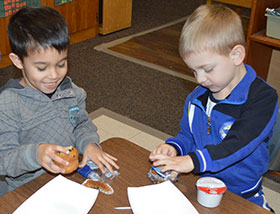Andrea Lewis doesn’t think of herself as someone with the bottomless drive to tackle any problem.
But she also won’t back away from issues she deems important. Those include navigating a winding process to secure a valuable piece of lifesaving medical equipment, in order to ensure the safety of one of her students.
Lewis, a teacher at the Great Start Readiness Program at South Godwin Elementary School, spearheaded an effort earlier this year that landed an Automated External Defibrillator (AED) at the school. While helping the school as a whole, Lewis said she began the project to help 4-year-old Feriz Malovcic, who is challenged by a congenital heart defect.

After meeting with school officials who told her that purchasing an AED was not likely within their budget, Lewis refused to take no for an answer.
“Something needed to be done and I didn’t think it was the parents’ responsibility to get an AED,” Lewis said. “I just thought, How can we do it?”
Her first step was doing homework on Feriz’s heart condition, in which complications arose in the formation of his heart while in the womb. Both great arteries are attached only to the right ventricle, instead of also using the left to pump blood, making it harder to get oxygen-rich blood to the rest of his body.
Lewis found the solution was for the school to have an AED on hand. Her husband Todd, an EMT for American Medical Response and a Walker firefighter, suggested contacting the Wes Leonard Foundation. The foundation was established in honor of Fennville High School basketball star Wes Leonard, who died in 2011 from a heart attack following a game in which he scored the winning basket and secured an undefeated regular season.
The foundation agreed with Lewis the school needed the machine.
“They put us at the top of their list because of need. I had a glimmer of hope,” Lewis said.

‘This Could Help Someone’
Still, she knew there was still a large gap between recognizing the need and eventually having an AED at school. Lewis admitted there were discouraging times during the effort, but she never lost sight of the end game. “You can only handle getting shot down so many times,” she said.
Charity Malovcic said while her son is doing well after three open-heart surgeries, she had significant concern whether his condition could be addressed at school.
“It’s one less thing to worry about,” Malovcic said of having the AED. “He’s pretty healthy now, but you never know.”
Whether the AED would ever be needed or not, Lewis said she wasn’t prepared to let the possibility of securing one slide by. “The chances are we will never need one, but the main purpose is this could help someone,” she said.
Lewis eventually achieved her goal when the Wes Leonard Foundation awarded the school a grant to purchase the machine. An acceptance ceremony was held during a Fennville-Saugatuck basketball game at Hope College.
Ryan Klinger, a volunteer for the Wes Leonard Foundation, said the organization receives about 40 to 45 AED requests per year nationally, and has granted more than 200 in the last six years. The foundation grants requests based on priority and holds two major fundraisers per year to help fund the equipment.
Klinger said the foundation saw the need at South Godwin Elementary as important.
“We bumped them to the top of the list,” Klinger said. “Obviously there was a concern to us. We always want to make sure a school has one if there is a need. We don’t want to miss a chance to help.”
One of the first tasks for Lewis after receiving the machine was to bring in her husband to explain to the class how the device worked. While not understanding much of it, Lewis said the students did grasp one critical fact.
“It saves people’s lives,” said 4-year-old Ayden Cruz. “When people are on the ground not moving, we know to get (the AED).”
The whole process took about six months, but Lewis said it was worth the work.
“I always have big ideas, but I don’t always have the time to go all out,” she said. “This was important.”
CONNECT









